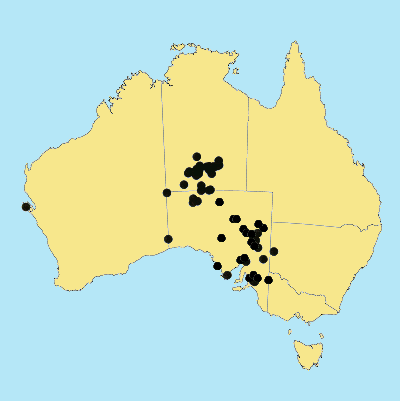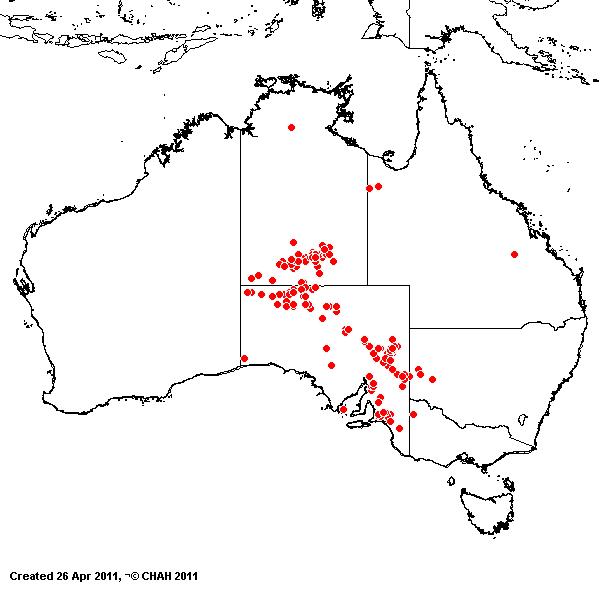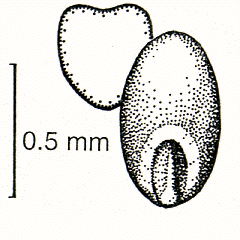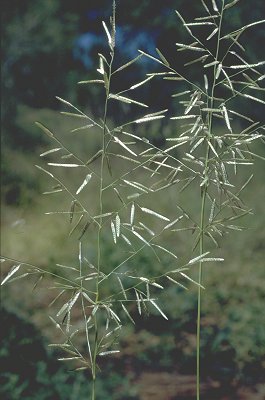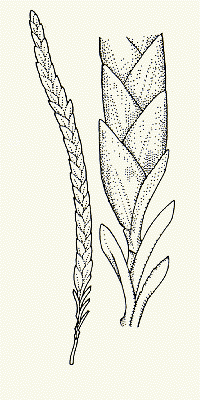Eragrostis barrelieri* Daveau. J. Bot. (Morot) 8: 289 (Sept. 1894); Bull. Soc. Bot. France 41: 556
(Nov. 1894).
Classification. (GPWG 2001) : Subfamily
Chloridoideae. Cynodonteae.
Type of Basionym or
Protologue Information: ST: Ascherson s.n., Egypt (P; IST:
K).
ST: Balansa 734,
Algeria
(P; IST: K).
ST: herb. Todaro
s.n., Italy: Sicily (P; IST: K).
ST: Barrelier s.n.,
South Europe.
Key references
(books and floras): [1981] M.Lazarides in J.Jessop (ed)., Flora of
Central Australia (459), [2002] D.Sharp & B.K.Simon, AusGrass,
Grasses of Australia, [2006] J.Jessop, G.R.M.Dashorst, F.M.James, Grasses
of South Australia (363), [2008] S.W.L.Jacobs, R.D.B.Walley &
D.J.B.Wheeler, Grasses of New South Wales (249).
Illustrations:
[2005] K.Mallet (ed.), Flora of Australia 44B: Poaceae 3
(Fig. 64H-I), [2006] J.Jessop, G.R.M.Dashorst, F.M.James, Grasses of South
Australia (364, Fig. 291), [2008]
S.W.L.Jacobs, R.D.B.Whalley & D.J.B.Wheeler, Grasses of New South Wales,
4th edn (249).
Habit. Annual.
Culms erect or geniculately ascending, 5–50(–80) cm tall. Ligule a fringe of
hairs, 0.5–1 mm long. Leaf-blades straight, flat or involute, 2–10 cm long,
2–5.5 mm wide.
Inflorescence.
Inflorescence compound, a panicle. Panicle lanceolate or oblong, 3–20 cm long.
Spikelets.
Spikelets sessile. Fertile spikelets many flowered, with at least 2 fertile
florets (5–30), comprising 5–30 fertile floret(s), with diminished florets at
the apex, linear or lanceolate or oblong, laterally compressed, 5–23 mm long.
Glumes. Glumes
similar. Lower glume lanceolate, keeled, 1-keeled, 1 -nerved. Upper glume
lanceolate, 1–2 mm long, keeled, 1-keeled, 1 -nerved.
Florets.
Fertile lemma 1.7–2.6 mm long, keeled, 3 -nerved. Lemma apex muticous. Anthers
3. Grain 0.65–1 mm long.
Continental
Distribution: Europe, Africa, Temperate Asia, Tropical Asia, Australasia,
North America, and South America.
Australian
Distribution: Western Australia, Northern Territory, South Australia,
New South Wales.
Western Australia: Carnarvon. Eucla,
Irwin. Northern Territory: Central
Australia North, Central Australia South. South
Australia: North-western, Lake Eyre, Gairdner-Torrens Basin, Flinders
Ranges, Eastern, Northern Lofty, Murray, Southern Lofty. New South Wales: North Far Western
Plains.
Notes.
Distinguishing characters include terminal and axillary panicles; glandular
panicles and foliage; chasmogamous and cleistogamous florets; scabrous lemmas,
with submarginal often ribbed lateral nerves; long ciliate ligule; thickened
caryopsis.
Introduced;
occurs in W.A. on Dirk Hartog Is. on the W coast and near the S.A. border at
Deakin, around Alice Springs in N.T., the Flinders Ra. and to the S in S.A. and
Broken Hill in N.S.W.; native to the Mediterranean region; introduced in
Africa, U.S.A. and India. Flowers Dec., Feb.-Mar., May, July-Aug., Nov.; fruits
Dec., Feb.-Mar., May, July-Aug., Nov.
